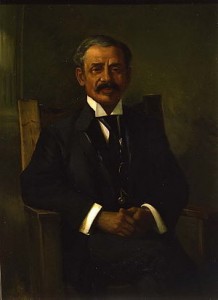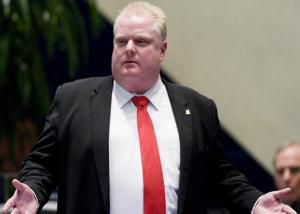A long time ago, Peter Ustinov described Toronto as “New York run by the Swiss.” This was during one of the periods when our city was considered a model for others [see my piece from five years ago about that period]. But it was not the first time. While it has sagged and stagnated at times, there were several periods when Toronto has been considered an epicenter of progress and modernity. During those periods, some able people rose in civic politics. Never perfect people, but at least talented and reasonably civic-minded. The sleezeballs, hacks and pinch-nosed bean-counters were at least temporarily eclipsed.
Now that we live in a time when the latter crowd have total dominion, it would be salutory to remember some examples of better ones. This brings me to consider the interesting career of William Peyton Hubbard.
Now he is principally known as the first prominent African-Canadian politician in Canada, but that is not what interests me. Hubbard only occasionally acted as Mayor. It was his long career on the City Board of Control and other administrative positions that made his reputation as the “Grand Old Man of Toronto” long before he literally became the city’s oldest citizen in his retirement. The son of American slaves who were smuggled into Canada via the Underground Railroad, Hubbard began with no greater ambition than to be a baker. But he read extensively, and embraced various reform ideas then current. One day, while strolling along the Don River, he saw a swimmer in difficulty, and saved him from drowning. The man turned out to be George Brown, the founder of the Anti-Slavery Society and the Toronto Globe. As their friendship blossomed, Brown urged him to enter civic politics. Hubbard ran in an upscale neighbourhood, and quickly made a name for himself opposing interests attempting to “privatize” the waterworks and hydro-electric utilities.
He cultivated and paved the way for Roland Caldwell Harris, the self-educated engineer, to build the most advanced municipal water system of its day. Harris was a man cut from a similar cloth to Hubbard. Harris had no formal qualifications, but he was passionate about building a superb urban infrastructure. His masterpiece, the Harris Water Plant, still functioning to this day, has been designated a national historic civil engineering site. His bridge over the Don was a technical miracle of its time, and is the subject of Michael Ondaatje’s novel In the Skin of a Lion. He habitually referred to his workmen in the city sewers as “heroes,” and was quoted as saying that “a city is something into which men put their souls. Paving blocks and hydrants are ectoplasm. A drain well dug is as glorious as an opera or a picture.”
Another public servant cultivated by Hubbard was Charles Hastings. After his daughter died of cholera from contaminated milk, Hastings campaigned to make Toronto the first city in Canada to Pasteurize milk. As Toronto’s Health Officer, Hastings organized a plethora of reforms that dramatically lowered the death rate in Toronto, in fact giving it the lowest urban death rate in North America. During that period, Toronto was lauded by the League of Nations as the exemplar of urban progress.
It is always dangerous to seek heroes in the past, since closer examination often reveals some dark or corrupt contradiction. But this seems unlikely with Hubbard, whose long career was renowned from beginning to end for honesty and devotion to the public good.
Now we live in a different time. Nobody is likely to laud Toronto as the exemplar of anything. I bumped into a business traveller, recently, from the Indian State of Andhra Pradesh. After discussing Andhra, he asked me, perplexed, why the urban infrastructure in Toronto was so backward. I could only be embarrassed. How could I tell him that there were no Hubbards, Harrises, or Hastingses around, and if there were, they would never be permitted to do anything. This is our current mayor:
I needn’t go into the putrid details. We all know what kind of an ass this creature is. Suffice it to say that in every respect, he is the polar opposite of William Peyton Hubbard.


Comments are closed.